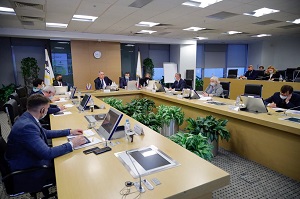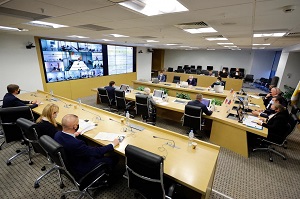Rosneft’s Ecologists Discuss Strategic Goals for Environmental Protection and Carbon Management

Rosneft has held the 7th Corporate Ecologist Convention. The event was attended by top managers, heads of departments and Company’s environmental protection specialists, along with more than 200 subsidiaries, as well as representatives of Rosneft’s foreign partners Equinor and BP.
Welcoming the participants, Brian McLeod, Rosneft’s Vice President for Health, Safety and Environment, noted the priority of the environmental and climate change agenda and Rosneft’s leading role in addressing key challenges for the oil and gas industry during the global energy transition.
 The convention focused on the results of the implementation of the Rosneft 2022 Strategy in terms of environmental protection, as well as a discussion of the Company’s Environmental Vision 2035. The vision incorporates three priority areas: carbon management, biodiversity conservation and environmental protection activities.
The convention focused on the results of the implementation of the Rosneft 2022 Strategy in terms of environmental protection, as well as a discussion of the Company’s Environmental Vision 2035. The vision incorporates three priority areas: carbon management, biodiversity conservation and environmental protection activities.
Presentations from various Rosneft and BP business units on decarbonisation, the climate agenda and the energy transition were of particular interest. In February 2021, Rosneft and BP agreed to cooperate on sustainability and carbon management. The joint efforts include assessing the prospects for new low-carbon projects, the use of CO2 capture and storage technologies, as well as the development of the hydrogen business and fuels with improved environmental performance.
Participants of the Ecologist Convention were also presented with the results of projects within the international Methane Initiative*. Rosneft is implementing a comprehensive programme of production process improvements and initiatives to reduce methane emissions. The expansion of this programme, as well as the introduction of innovative technologies, will help to reduce its methane emission intensity to a target level of less than 0.25%.
Unmanned aerial vehicle scanning is used to reduce methane emissions in the transport system. Drones are widely used at Rosneft’s subsidiaries, particularly at Samotlorneftegaz and RN-Krasnodarneftegaz facilities. Drone flights improve the timeliness and accuracy in identifying problem areas in the low temperatures of the Far North.
Waste management practices and opportunities for waste utilisation, as well as biodiversity conservation, were also among the topics discussed. The ESG agenda included a session on the principles of circular economy, during which representatives from Equinor shared their experiences in this area.
Note for Editors:
Rosneft was the first company in Russia to present the Carbon Management Plan 2035 featuring clear targets for reducing greenhouse gas emissions. The plan includes:
- prevention of direct and indirect greenhouse gas emissions of 20 million tonnes CO2-equivalent,
- a 30% reduction in the intensity of direct and indirect emissions in oil and gas production,
- a methane emission rate below 0.25%,
- zero routine flaring of associated gas.
The Company is developing cooperation in carbon management and sustainability with foreign partners. Rosneft signed cooperation agreements with BP, Baker Hughes, ExxonMobil and the Japanese Ministry of Economy, Trade and Industry (METI) to support its long-term emission reduction goals.
The Company’s activities are highly praised by the global investment community that considers socially responsible investments a long-term trend. FTSE Russell, a unit of the London Stock Exchange, has confirmed Rosneft’s inclusion into the global FTSE4Good Index Series. Rosneft is recognised as the leading Russian oil and gas producer in a number of international ESG ratings, including Refinitiv and Bloomberg. Rosneft ranked best among most comparable international and Russian companies in Sustainalytics ESG rating with a score of 33.8. Rosneft was also the only Russian company to be included in the Top-100 ESG of the Vigeo Eiris Best Emerging Market Performers Ranking.
*Methane Initiative. In June 2019, Rosneft joined the initiative of the world’s leading oil and gas companies and signed “The Guidelines for Methane Emission Reduction in Natural Gas Supply Chain”, which provide for a consistent reduction in methane emissions.
Among the participants in the initiative are BP, Equinor, Eni, ExxonMobil, Royal Dutch Shell, Total, Gazprom and other oil and gas sector companies. Eric Liron, Rosneft’s Vice President for Oil and Gas Services, has joined the Steering Committee of “The Guidelines for Methane Emission Reduction”.
Rosneft
Information Division
December 10, 2021